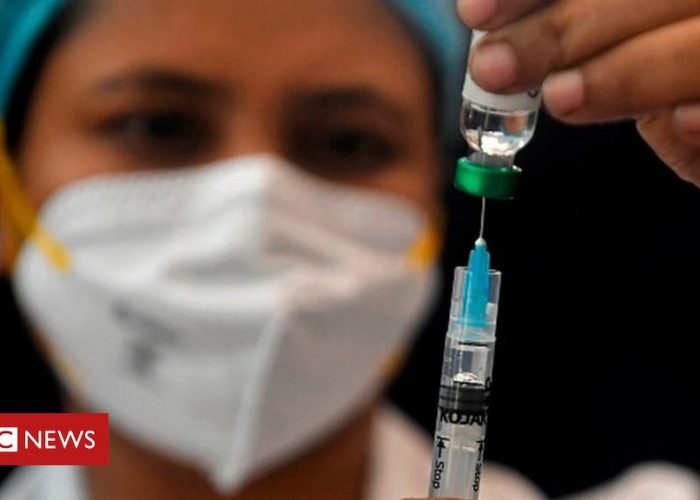image captionThe government plans to vaccinate 300 million people by early August
India will on Saturday begin one of the world’s largest vaccination programmes, aimed at protecting more than 1.3 billion people from Covid-19.
Millions of doses of two approved vaccines – Covishield and Covaxin – have been shipped across the country.
They will go first to health workers and frontline workers, then to other at-risk groups.
India has recorded the second-highest number of Covid-19 infections in the world after the United States.
An estimated 10 million health workers will be vaccinated in the first round, followed by policemen, soldiers, municipal and other front-line workers.
Next in line will be people aged over 50 and anyone under 50 with serious underlying health conditions. India’s electoral rolls, which contain details of some 900 million voters, will be used to identify eligible recipients.
The government plans to vaccinate 300 million people by early August. This will happen in state-run health care centres, schools, colleges, community halls, municipal offices and wedding halls.
India’s drug regulator has given the green light to two vaccines – Covishield (the local name for the Oxford-AstraZeneca vaccine developed in the UK) and Covaxin, locally-made by pharma company Bharat Biotech.
Main Indian vaccine makers
- SIITwo vaccines (one approved)
- Bharat BiotechTwo vaccines (one approved)
- Biological ETwo vaccines (in trial phase)
- Zydus CadilaOne vaccine (in trial phase)
- Gennova BiopharmaOne vaccine (in trial phase)
- Dr Reddy’s LabOne vaccine (in trial phase)
Source: Media reports
But concerns have been raised over the efficacy of Covaxin because the
regulator’s emergency approval came before the completion of Phase 3 clinical trials. The regulator and the manufacturer have said the vaccine is safe, and that the efficacy data would be available by February.
Both vaccines will be given as two injections, 28 days apart, with the second dose being a booster. Immunity would begin to kick in after the first dose but reaches its full effect 14 days after the second dose.
media captionHow India is preparing to roll out Covid-19 vaccines
The status of the vaccines and recipients will be electronically tracked in real time – some 8 million people who will receive the early jabs have been already registered. More than 600,000 people have been trained for the drive.
The jabs will be voluntary, and recipients will be given a certificate of vaccination after they complete both doses.
“I expect India’s vaccination programme will be run much better than most countries because of the considerable government investment and early preparedness,” Dr Gagandeep Kang, one of India’s best-known vaccine experts, told the BBC.
Farah Husain, a critical care specialist in Delhi’s largest Covid-19 hospital, will be receiving one of the first jabs on Saturday.
“It has been a long and taxing journey being on the front line and trying to keep my family safe. My parents and grandparents helped me take care of my children, so I had to practice isolation from my children too in order to avoid the spread,” Dr Husain told the BBC.
“This vaccine gives me hope that this is the first, significant step in preventing further exposure of my family due to my job. It will lift this heavy burden from my shoulders.”
With more than 10 million cases, India has recorded the second-highest number of Covid-19 infections in the world, after the US.
The largest vaccination drive in the country, however, begins at a time when infections have fallen sharply, and much of life has returned to normal. A limited availability of doses in the initial phase, therefore, is not likely to pose a problem.
Most scientists feel India is primed for the challenge as it is a vaccine-making powerhouse and has run, for decades, a well-oiled immunisation programme for tens of millions of new-borns and mothers-to-be.
But the real challenges will begin when the general population starts receiving the jabs.
India will use its formidable election machinery to deliver and track doses to recipients in far corners of the country. It is also likely to use digital platforms and apps to enable people to register for the doses.
However, not every Indian owns a smart phone or knows how to operate an app, so it will be interesting to see what the government does to make sure that there are no inadvertent exclusions.
Vaccine hesitancy is the other concern.
image captionMillions of doses of two approved vaccine have been shipped across the country
The recent controversy over the hurried approval of Covaxin, many feel, could undermine confidence. There’s a history of hesitancy about receiving the polio vaccine in parts of northern India, triggered by rumours about vaccines being impure and affecting fertility. Similar disinformation is now circulating about Covid vaccines on social networking apps, such as WhatsApp.
The government will need consistent, clear-eyed communication to bolster vaccine acceptance and community perception of the programme.
Vaccines come with side effects for some people. India has a 34-year-old surveillance programme for monitoring such “adverse events” following immunisation.
But researchers have found that benchmarks for reporting side effects still remain weak. A failure to transparently report adverse effects could easily lead to fear-mongering around vaccines.read more


